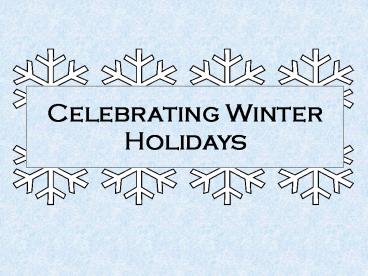C - PowerPoint PPT Presentation
1 / 10
Title:
C
Description:
Hanukkah is more of a celebration than a religious holiday. ... The holiday involves worship that is centered more in the home than in the synagogue. ... – PowerPoint PPT presentation
Number of Views:37
Avg rating:3.0/5.0
Title: C
1
C
el
e
bra
t
ing Wi
n
ter
Hol
i
days
2
Chanukah or Hanukkah
Hanukkah is the Hebrew word for dedication.
Hanukkah is more of a celebration than a
religious holiday. It celebrates the liberation
of Jerusalem and the rededication of the Temple.
When the Hebrews were preparing to rededicate the
Temple, they only found enough oil for the Temple
lamp for one day. According to legend, the oil
lasted for eight days. The lighting of candles
for eight consecutive nights has become the
traditional way to celebrate Hanukkah.
Chanukah begins November 30th and lasts until
December 7th.
3
Traditions of Chanukah Chanukah lasts eight
days. On each day feelings of gratitude are
expressed through special prayers, and the lights
of the Menorah are lit each evening. It is also
customary during the holiday for members of the
family to play dreidel, to give presents, and to
eat oily delicacies such as donuts, pancakes and
"latkes."
Happy Chanukah
4
History of Christmas Annual Christian
celebration honoring the birth of Jesus
Christ Celebrated in December since the fourth
centuryMany countries exchange gifts and/or
cards Christmas is a religious holiday and a
secular winter holiday
Christmas
Joyeux Noel
Feliz Navidad
Merry Christmas
5
(No Transcript)
6
(No Transcript)
7
Christmas TraditionsHolly Mistletoe The
Poinsettia Christmas Carols The Christmas
Star The Christmas Tree
8
Kwanzaa
Kwanzaa is December 26th through January 1st. Dr.
Maulana Karenga started the celebration of
Kwanzaa in 1966.
Representation of Colors Black is for the face of
the African American people Red is for the blood
that the African American people shed Green is
for hope and the color of the motherland
Kwanzaa Ritual The Kinara (candleholder) is
placed atop the Mkeka (mat, usually straw). The
Mishumaa Saba (seven candles) represent the Nguzo
Saba (seven principles). Each candle represents a
distinct principle beginning with Umoja. Candles
are then lit each day alternately from left to
right. Three red candles should be placed on t he
left and three green candles should be placed on
the right.
9
The Nguzo Saba (seven guiding principles) Umoja
(OO-MO-JAH) Unity stresses the importance of
togetherness for the family and the community,
which is reflected in the African saying, "I am
We," or "I am because We are." Kujichagulia
(KOO-GEE-CHA-GOO-LEE-YAH) Self-Determination
requires that we define our common interests and
make decisions that are in the best interest of
our family and community. Ujima (OO-GEE-MAH)
Collective Work and Responsibility reminds us of
our obligation to the past, present and future,
and that we have a role to play in the community,
society, and world. Ujamaa (OO-JAH-MAH)
Cooperative economics emphasizes our collective
economic strength and encourages us to meet
common needs through mutual support. Nia
(NEE-YAH) Purpose encourages us to look within
ourselves and to set personal goals that are
beneficial to the community. Kuumba
(KOO-OOM-BAH) Creativity makes use of our
creative energies to build and maintain a strong
and vibrant community. Imani (EE-MAH-NEE) Faith
focuses on honoring the best of our traditions,
draws upon the best in ourselves, and helps us
strive for a higher level of life for humankind,
by affirming our self-worth and confidence in our
ability to succeed and triumph in righteous
struggle.
10
Kwanzaa is a Swahili word that means "first
fruits of the harvest."
Kwanzaa builds on the five fundamental
activities of Continental African "first fruit"
celebrations ingathering reverence
commemoration recommitment and celebration.
Happy Kwanzaa































